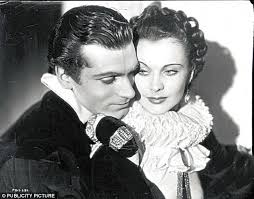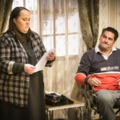Cocteau’s Saintly Monsters at the National
A Different Kind of Guardsman at the Pesti
As a director, what do you do when you have a good play full of passionate speeches and emotional twists, a strong and professional cast, and the vast resources of the National Theatre? Unfortunately, András Dér decided to clutter it up with too much extraneous material. First, he projects a series of Jean Cocteau-related archive photos in a perpetual loop. Yet, it is annoying to see the same twelve pictures over and over as we wait for the play to begin. It would have been much more pleasant if he had simply dimmed the lights and given us a half-minute slide show prior to the action. Then, Bence Mátyássy appears holding a series of masks. This works thematically, but it is never developed into any meaningful point. There is an intermission after a brief first act, although it would have been more effective after the second. Finally, there are added songs (credited to the formations Pegasi Don’t Exist and Sziámi), which merely seem tacked on.
These little blunders make me suspect that András Dér is not really a theatre man. He lacks that sense of what works on a stage. He appears to be dabbling in the craft. For example, it is a dramaturgical blunder to put a set of drums onstage when no one ever plays them. Instead, we get a film of Bence Mátyássy playing the drums to underline the fact that they are unnecessary. (Unless this is a reference to the lead actor’s speech about films being only shadow and no substance. In that case, I congratulate the director on his cleverness.) Even the set seems wrong for an intimate chamber piece. The actors perform in vaguely defined areas within the wide expanse of the Gizi Bajor Studio. Also, in this world, people take baths and showers in their clothes.
Still, let us concentrate on the positive elements, because there are plenty. Saintly Monsters (Szent szőrnyetegek) is well-written, like an existential All About Eve. In Cocteau’s time, of course, the conflict was about actors leaving the theatre (described as both a convent and a crypt) for a shot at stardom and fame in the new media of film. In this updated version, we are in Budapest's National Theater building, where Florent (Zoltán Rátóti) and Esther (Eszter Nagy-Kálózy) are established stars. Liane (Eszter Ács) would like to use them as a springboard to a Hollywood career, even if that means breaking up their marriage and appearing in tabloid magazines, caught on romantic dates with the older star.
The situation is very plausible. How many actresses have spurred their careers by turning the head of an older (sometimes married) producer? Marilyn Monroe certainly did. In this case, Liane is too ambitious; she wants fame and fortune immediately. Her target is all too human and gives in easily to temptation. Only she has not counted on the wife’s strategy of passionate non-resistance.
The point of the play is they are all actors. Everyone is playing a role and trying to out-act the others. All of the female cast members, including Auguszta Tóth and Mari Nagy in supporting parts, understand the game well and turn in solid performances. Zoltán Rátóti, though charismatic, should be bolder in bringing out his character’s egotism and vanity. After all, multiple characters describe Florent as a great artist and an emotional coward, so the role requires a degree of self-parody. If he does not “play” the actor, then the final twist, in the last scene between the husband and wife, does not work.
Similarly, in Ferenc Molnár’s The Guardsman (Testőr), now playing at the Pesti Theater, the husband and wife are successful actors. Here, the jealous husband plans to test his wife’s fidelity by playing a dashing and dumb military man and attempting to seduce her.
I approached this production tentatively, since I adored the Örkény Theatre’s version of The Guardsman, which premiered in 2001. Pál Mácsai and Éva Kerekes luxuriated in the dialogue. Another reason I am sentimental, I was learning Hungarian at the time, and the words were so crystal clear. Not everyone was so enthusiastic. My friend Benjamin McQuade called the Örkény version “slow and enervated,” claiming he far preferred the Pesti show.
He has a point. Here the emphasis is on the comedy. Enikő Eszenyi and András Stohl inject the play with plenty of energy and star power. András Kern proves to be a great straight man, feeding the co-stars their cue lines like a pro. They also bring the story into the present with the sets and costumes (while strangely retaining some dated references). The production is not cheap, but then why should it be? This is a power couple living well at the pinnacle of success. Yet, first and foremost, they are actors, overdramatic and self-obsessed. Clearly, this comedy is built upon the self-parody of dueling theatre artists, and András “Buci” Stohl and Enikő Eszenyi excel at this.
With all due reverence, let me point out some small details that would enhance their performances. Stohl rules the first act, but his guardsman is such a caricature, he can only show strong emotion by breaking character. This limits his range as the alter ego. He also should not take a back-seat to Enikő in Act Three, but continue to spar with her. Their romantic scene is quite hot (unthinkable in the earlier production), but when he kisses his wife’s body, it should be passionate, not mechanical. He could learn a lesson from his colleagues at the Vígszínház, Gábor Hever and Csenge Szilágyi in A Pentheszileia Program.
Enikő has a tricky role as the wife, since we should always be unsure whether she recognizes her husband as the guardsman. The more ambiguity the better. Sometimes she seemed to see through him, but at the end, she panicked as though his unmasking were a surprise. Even in the second act, where she emerges several times from her box at the opera, her moods seemed inconsistent (although Benjamin McQuade suggested that she was affected by the opera music, which he identified as Madame Butterfly). It would be less jarring if she did not concentrate on hitting every punch line, which she does with astounding accuracy, and focused more on the arc of her scenes.
Actors are a special breed, and perhaps they bring more understanding to a relationship with another actor. Playing an actor who is playing a part for another actor who is playing an actor may be a conundrum, but the results can be fun to watch.
A bejegyzés trackback címe:
Kommentek:
A hozzászólások a vonatkozó jogszabályok értelmében felhasználói tartalomnak minősülnek, értük a szolgáltatás technikai üzemeltetője semmilyen felelősséget nem vállal, azokat nem ellenőrzi. Kifogás esetén forduljon a blog szerkesztőjéhez. Részletek a Felhasználási feltételekben és az adatvédelmi tájékoztatóban.





